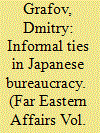| Srl | Item |
| 1 |
ID:
183450


|
|
|
|
|
| Summary/Abstract |
This article analyzes the informal system of relations in Japan (Jinmyaku). Its essence is collective loyalty, and it serves as the basis of the practice of transferring Amakudari (retired officials) to top positions in the corporations and companies that they regulated while serving in government ministries. It is believed that Amakudari allowed government to run the businesses most efficiently and were one factor of the Japanese economic miracle. However, after a series of scandals in the 1990s, attitudes toward this practice began to change, and it was increasingly associated with corruption. In 2008, the National Civil Service Act banned officials from working in companies with which they had contacts while working in civil service for two years after leaving their post. Exceptions were possible only with the consent of the National Personnel Office. But the Amakudari practice continued unofficially and still exists today.
|
|
|
|
|
|
|
|
|
|
|
|
|
|
|
|
| 2 |
ID:
175077


|
|
|
|
|
| Summary/Abstract |
Why did the so-called hub-and-spokes alliance system emerge in East Asia after World War II instead of a multilateral alliance? Realists and constructivists offer various explanations, pointing to such factors as the United States' preference for bilateral alliances, the absence of a collective identity, and historical memories of Japanese imperialism. None of these explanations is satisfactory, however. Indeed, the historical record reveals that the United States sought a multilateral alliance in East Asia until the early 1960s. A theoretical model based on a social exchange network approach explains how a specific form of network can develop among potential allies. In East Asia, three U.S. allies—Japan, South Korea, and Taiwan—contributed to the emergence and shape of the hub-and-spokes system, which came into being as an unintended consequence of their interactions. The preferences and behavior of these allies proved at least as consequential as those of the United States in shaping this system. The implications of this finding could be significant for alliance politics in contemporary East Asia.
|
|
|
|
|
|
|
|
|
|
|
|
|
|
|
|